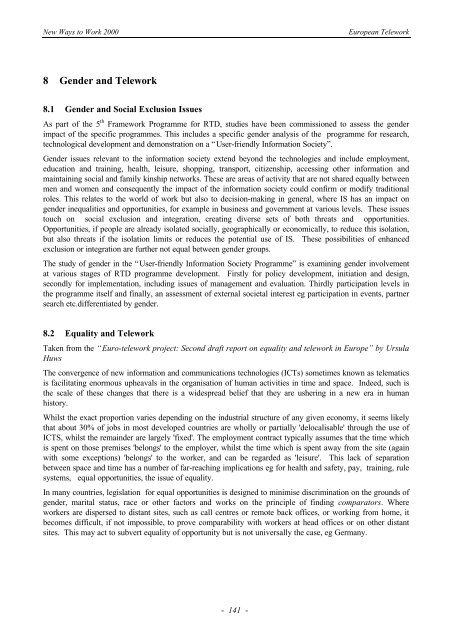eWORK 2000 - European Telework Week
eWORK 2000 - European Telework Week
eWORK 2000 - European Telework Week
- No tags were found...
You also want an ePaper? Increase the reach of your titles
YUMPU automatically turns print PDFs into web optimized ePapers that Google loves.
New Ways to Work <strong>2000</strong><strong>European</strong> <strong>Telework</strong>8 Gender and <strong>Telework</strong>8.1 Gender and Social Exclusion IssuesAs part of the 5 th Framework Programme for RTD, studies have been commissioned to assess the genderimpact of the specific programmes. This includes a specific gender analysis of the programme for research,technological development and demonstration on a “User-friendly Information Society”.Gender issues relevant to the information society extend beyond the technologies and include employment,education and training, health, leisure, shopping, transport, citizenship, accessing other information andmaintaining social and family kinship networks. These are areas of activity that are not shared equally betweenmen and women and consequently the impact of the information society could confirm or modify traditionalroles. This relates to the world of work but also to decision-making in general, where IS has an impact ongender inequalities and opportunities, for example in business and government at various levels. These issuestouch on social exclusion and integration, creating diverse sets of both threats and opportunities.Opportunities, if people are already isolated socially, geographically or economically, to reduce this isolation,but also threats if the isolation limits or reduces the potential use of IS. These possibilities of enhancedexclusion or integration are further not equal between gender groups.The study of gender in the “User-friendly Information Society Programme” is examining gender involvementat various stages of RTD programme development. Firstly for policy development, initiation and design,secondly for implementation, including issues of management and evaluation. Thirdly participation levels inthe programme itself and finally, an assessment of external societal interest eg participation in events, partnersearch etc.differentiated by gender.8.2 Equality and <strong>Telework</strong>Taken from the “Euro-telework project: Second draft report on equality and telework in Europe” by UrsulaHuwsThe convergence of new information and communications technologies (ICTs) sometimes known as telematicsis facilitating enormous upheavals in the organisation of human activities in time and space. Indeed, such isthe scale of these changes that there is a widespread belief that they are ushering in a new era in humanhistory.Whilst the exact proportion varies depending on the industrial structure of any given economy, it seems likelythat about 30% of jobs in most developed countries are wholly or partially 'delocalisable' through the use ofICTS, whilst the remainder are largely 'fixed'. The employment contract typically assumes that the time whichis spent on those premises 'belongs' to the employer, whilst the time which is spent away from the site (againwith some exceptions) 'belongs' to the worker, and can be regarded as 'leisure'. This lack of separationbetween space and time has a number of far-reaching implications eg for health and safety, pay, training, rulesystems, equal opportunities, the issue of equality.In many countries, legislation for equal opportunities is designed to minimise discrimination on the grounds ofgender, marital status, race or other factors and works on the principle of finding comparators. Whereworkers are dispersed to distant sites, such as call centres or remote back offices, or working from home, itbecomes difficult, if not impossible, to prove comparability with workers at head offices or on other distantsites. This may act to subvert equality of opportunity but is not universally the case, eg Germany.- 141 -








